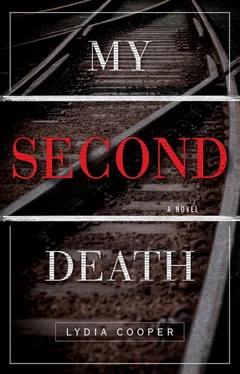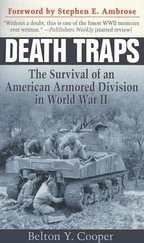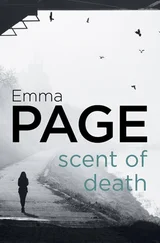Advent starts.
I see holiday wreath lights on the streetlamps downtown and remember the flyer for Handel’s Messiah that Judith Greene gave me. 411 Allyn Street is wrapped in yellow tape and scheduled for demolition. There is only one thing left that I can do. It’s like moving a pawn against an inevitable checkmate.
I tack the flyer up on the fridge but Aidan doesn’t say anything about it. I’m not sure he even notices. He spends a lot of his time gone, and I’m not sure if he’s drinking, or if he’s visiting his sister Stella, or if he’s painting oil canvases the size of a small bus in the art building.
Two Sundays before Christmas I sneeze into a gloved hand and stand on the sidewalk looking up at the wooden doors of St. Bernard’s church.
Today there is no soup kitchen. The church is reserved for shiny happy Akronites only. I look down at the flyer in my hand. Today, Judith Greene’s choir is performing Handel’s Messiah . The church looks elegant, the stone weathered and dignified, the pillars by the double doors yellowed with age.
I walk up the steps and go in. The foyer floor is carpeted with a faded gray rug and the boards creak under my feet. A white-haired woman in a green and red cable-knit sweater sits behind a folding metal desk selling programs for five dollars. I pull a body-warm bill from my jeans pocket and hand it to her. Her fingers fold over the note, but the gloves covering my hand protect my skin.
Inside the sanctuary is dark and red candles gleam like dozens of eyes along the walls. Narrow stained glass windows line the walls and the stone alcoves are guarded by statues of saints with hands upraised in benediction. People cluster along the pews, some sitting on the faded tomato-soup-colored seat cushions, others kneeling in solitude, most clumped together talking in low voices and laughing. The room smells of old wood and talcum powder and candle wax.
I find a bench at the far side of the room that is empty. More people come in, most of them old women in plastic head-covers and middle-aged men and women wearing expensive camel-colored overcoats and smelling like perfume and sweet port.
After a while the doors at the end of the sanctuary close and everyone sits, muffled whispers and the rustle of clothes drifting around me. Doors to the side of the altar open and a straggling line of people wearing cheap white robes enter, holding songbooks in front of their chests. They shuffle to the front of the room and stand in three rows and begin to sing.
The stuffiness in my clogged nose evaporates. She was right, the crazy cat lady was right. Handel’s Messiah is beautiful. The voices are stretched tight and woven together until they don’t even sound human. Sweeping chords press up against the shadow-hidden peak of the church ceiling.
I close my eyes. When the choir reaches the chorus I hear creaks and rustles and I open my eyes to find people standing all over the sanctuary. I remain with my gloved hands crossed under my breasts, my knees pressed together, and I look up at the walls, at the stained glass winking with light from passing cars outside. The flickering bright-colored light refracts the church’s gloom, bending dark into showers of garnet and gold.
A wooden shelf covered in faded red velveteen lies in front of my scarred pew. I put my dirt-crusted sneaker on the velveteen and wonder what it is for until I realize it is meant for kneeling, for penitence or supplication.
The music infects me. I can feel all my nerve endings lying against the outer rim of my skin. I get up and bend, my knees pressing into the faded board. When I lift my eyes I see the choir, the crucifix, and the soaring panes of stained glass behind them. Their voices etch the contours of the suffering behind them. I imagine hundreds of believers kneeling on this spot before me, learning pain through ecstatic imagination. Staring at these images of Christ, at the vivid welts, the bracketed ribcage, the pain-arched toes, they must have learned all the delicate flavors of soul-destroying love, the savory tang of immolation. The pure wretched agony of compassion.
On one glass panel a tortured Christ hangs on a cross and a flare of headlights gilds his body, illuminating dark streaks traveling in crooked lines like falling blood or tears. I realize that it has begun to rain outside and water weeps down the colored glass.
The air in the church is thick with human smells. I don’t understand why the sound of human voices fills me with such happiness. When I can’t stand it any more I go outside and sit down on the front steps, the stone cold under my ass, and watch rain slant down across the grime-darkened city.
I put my elbows on my knees and bend my head against the rain. I came here for a reason and I need to follow through, to finish off this investigation. It doesn’t matter that the choir sounds like resurrection.
I grip the rain-slick rail beside me and stand, pulling my weight up. My knuckles turn pale, the bone jutting up, stretching the skin translucent as rice paper.
The stone, the sky, the city vibrate with hallelujahs.
Here’s the truth. I know who killed Aidan’s mom. I mean, it’s not rocket science. I can get the confession to prove it. The whole story. The ugly explanation, the facts, the cold hard — whatever.
I stay on the church steps, leaning against the iron railing with an icy drizzle running through my hair. When the music dies inside the chapel, I go around the side of the church. The little alley slopes downhill, a row of cars parked by meters, bumper to bumper. A metal railing around a sunken flight of steps leading to the church basement door, from which the choir members will emerge after their stirring performance.
I walk down the steps and stand in half-lit shadow for what feels like hours by a small industrial door in a filthy stairwell. And finally the choir members come out.
A woman buttoning a coat and laughing with a tall man carrying a hefty trombone case. Another man yelling into a cell phone to goddamn fix it, what’s the goddamn problem .
Judith Greene comes out last.
Like the others, she doesn’t seem to notice me. The door shuts after her with a hollow clang.
I follow her up the stairs and she turns halfway, hearing me or sensing my breath on her. Her skin looks like the flushed, translucent flesh of a ripe plum in the cheap halogen light.
“Oh,” she says. Her voice falls at the end as if she has come sooner than she expected to a place she knew she was heading all along.
“Are you parked in the deck?”
She looks at me for a long time. Then she turns her head with the drugged motion of a sleepwalker and gazes up at the sidewalk above, people hurrying down the slanted sidewalk, cars passing. “Yes.”
“Then we’re going to talk here.”
Her eyes moves to my face. The whites are damp, shiny. “What — what is this about?”
I can’t hear any of Handel’s eerie, perfect music in her voice. Her voice just sounds hoarse, thick with sweat and cat piss. I take another step so that I am level with her, my head looming over hers. Her fat body takes most of the narrow ledge and I lean forward until she is pressed against the grainy, rain-wet stone wall.
“In the spirit of full disclosure,” I say, “I should tell you that I killed a man when I was ten. Also, I got perfect scores on my SATs and on my graduate exams. According to the education system, I’m a genius or close enough to make no difference. According to my shrinks, I’m a borderline sociopath.”
Her fleshy cheeks quiver.
“So keep those two facts in mind and bear with me. I’m going to ask you some questions. The first one is this: Do you know how wiped out you’d be if you swallowed 48 milligrams of Ambien and 30 milligrams of Prozac? Close to comatose, almost immediately. And do you know how long it would take to partially metabolize that much? Long enough to suggest you took the pills before starting an accelerated fire. Which makes sense, right? I mean, you wouldn’t want the fire department charging in and you with one hand stuck in the Ambien bottle like the proverbial kid and the cookie jar. Right? But keep in mind that we’re practically comatose already. Are we likely to be dashing upstairs and down like Wee Willie Winkie with arsonist intentions? And here’s my other question. My roommate’s autistic sister wears a diaper. What kind of person wears a diaper but has the wherewithal to start two fires that burn hot, fast, and are localized in places brilliantly compromising the structural integrity of the house?”
Читать дальше












